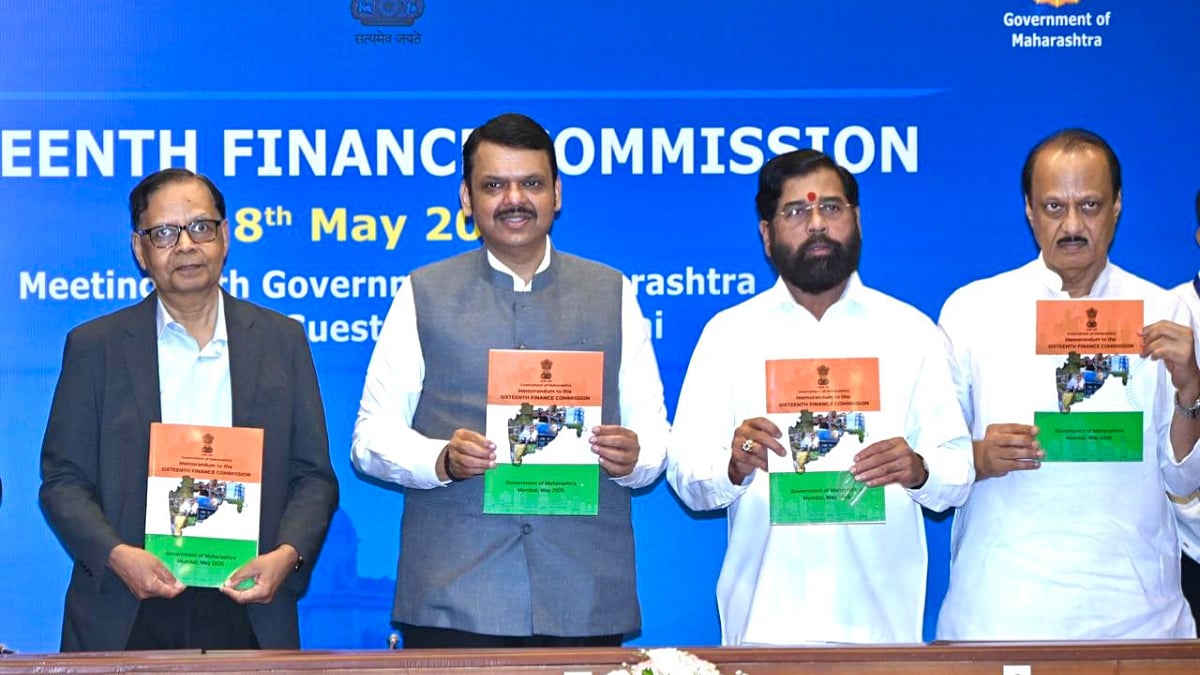Chief Minister Devendra Fadnavis, along with Deputy CMs Eknath Shinde and Ajit Pawar, Minister of State for Finance Ashish Jaiswal, and senior officials, presented Maharashtra’s demands to the 16th Finance Commission, led by Chairman Arvind Panagariya. | X – @CMOMaharashtra
Mumbai: The Maharashtra government made a strong case to the 16th Finance Commission, urging for an increase in its share of central tax revenues from 41% to 50%. Additionally, the state called for the inclusion of cesses, surcharges, and non-tax revenues in the divisible pool.
Chief Minister Devendra Fadnavis, along with Deputy CMs Eknath Shinde and Ajit Pawar, Minister of State for Finance Ashish Jaiswal, and senior officials, presented Maharashtra’s demands to the 16th Finance Commission, led by Chairman Arvind Panagariya.
The state argued that, as a high-performing region, it deserves a larger share of central funds, aligning with similar demands from other developed states like Gujarat, Tamil Nadu, and Karnataka.
Currently, Maharashtra receives 6.31% of the 41% tax share distributed to states, amounting to an estimated ₹89,726 crore for 2025–26. The state expects to receive around ₹1.2 lakh crore annually between 2025–26 and 2029–30. The state also requested a special assistance package of ₹1.28 lakh crore.
This includes ₹1.17 lakh crore for major infrastructure projects like the Mumbai Metropolitan Region economic master plan (₹50,000 crore) and river-linking initiatives (₹67,051 crore). An additional ₹11,180 crore has been requested as special grants for projects like a new Bombay High Court building, prison upgrades, postgraduate medical education, and eco-tourism development in Vidarbha.
The government highlighted its efforts to maintain fiscal discipline, pointing to a tax-to-GDP ratio lower than the national average and a fiscal deficit under 3% of GSDP. The Finance Commission acknowledged that Maharashtra’s demands are legitimate and will be reviewed before the final report, due by May 31.
Maharashtra proposed key changes to the criteria for fund allocation between states, advocating for greater weight on factors such as rural and urban populations, forest cover, and sustainable development. The state recommended reducing the emphasis on “income distance” and placing more importance on demographic performance, contribution to India’s GDP, and tax efforts.
Highlighting its transformative phase, Maharashtra pointed to major infrastructure projects like the Mumbai Trans Harbour Link, Coastal Road, and Samruddhi Mahamarg, all nearing completion. With ongoing projects such as Navi Mumbai Airport and Vadhavan Port, the state aims to achieve a $1 trillion economy.
Officials emphasized that supporting high-performing states like Maharashtra would not only benefit the state but also contribute to India’s overall growth.
